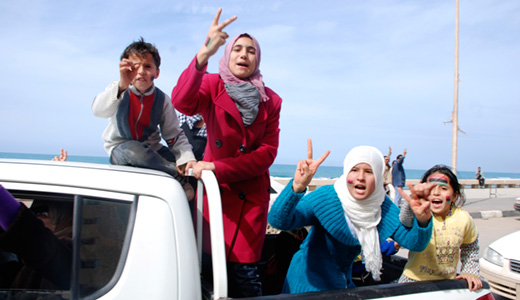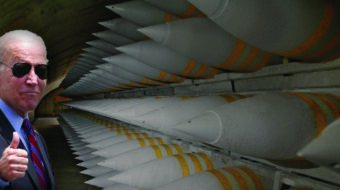
Warhawk Senators John McCain, R-Ariz., and Joe Lieberman, I-Conn., told CNN Sunday they want the U.S. to send arms to Libyan opposition groups and set up a no-fly zone over the country. But others are not so sure, including even some Republicans. Sen. Lindsay Graham, R-S.C., cautioned, “One thing I’ve learned from Iraq and Afghanistan, you have to think these things through.”
Indeed.
Reports of government air and ground attacks on protesters, images of the regime of Muammar Gaddafi killing its own citizens, are drawing virtually unanimous worldwide condemnation.
But Libyan opponents of Gaddafi say they oppose foreign military intervention.
In an article published March 1 in the UK Guardian, a Libyan blogger from Tripoli, the country’s capital, writes of “a fear shared by all Libyans; that of a possible western military intervention to end the crisis.”
Libyans “of all stripes” believe that any foreign military intervention whether on the ground or by limited air strikes, would unleash further bloodshed by the Gaddafi regime, the blogger writes, using the pseudonym Muhammad min Libya.
The blogger concludes, “This is a wholly popular revolution, the fuel to which has been the blood of the Libyan people. Libyans fought alone when western countries were busy ignoring their revolution at the beginning, fearful of their interests in Libya. This is why I’d like the revolution to be ended by those who first started it: the people of Libya.”
At present there appears to be a standoff between Gaddafi’s forces and opposition forces, who are now reported to be in control of the eastern part of the country. The United Nations is speaking of a humanitarian emergency as tens of thousands of very poor contract workers try to flee the violence, massing at the borders with neighboring Tunisia and Egypt.
Yet many in the region and elsewhere find it an unseemly sight to see former colonial occupiers Britain and France wringing their hands over the plight of Libya’s people, and calling for Gaddafi’s ouster. It is not lost on many that British and French oil interests (BP, Total, etc.) would welcome a freer hand in oil-rich Libya.
As for the United States, which took over the dominant capitalist power role in the region after World War II, and especially after the collapse of the Soviet Union in the early 1990s, it is viewed with deep suspicion by many. U.S. condemnation of Gaddafi, while continuing to support repressive regimes like that of Saudi Arabia, suggests double standards dictated by oil politics.
At the same time, some people sincerely concerned about the humanitarian crisis and the Libyan people’s struggle for democracy want the U.S. to do something. But what?
On Saturday the United Nations Security Council adopted a resolution calling for a freeze on Gaddafi’s assets and referred his regime’s attack on its citizens to the International Criminal Court. On Monday, the Obama administration announced it had seized $30 billion in Libyan assets and the European Union adopted an arms embargo and other sanctions. Secretary of State Hillary Clinton said the U.S. was sending aid workers to Libyan border regions with Tunisia and Egypt, and has allocated $10 million for emergency relief, to help refugees at the borders.
The Pentagon said it was sending military aircraft and ships closer to the Libyan coast, with the stated purpose of being ready for a “potential military role in the humanitarian effort,” as the New York Times described it.
The Times says Clinton “bluntly told the Libyan leader on Monday to surrender power ‘now, without further violence or delay.'”
Col. David Lapan, a Pentagon spokesman, told reporters, “As part of our contingency planning to provide the president flexibility on a full range of options regarding Libya, we are repositioning forces in the region.”
But, the Times reports, U.S. officials say privately that “any United States military presence could undermine the legitimacy of the Libyan revolt as an internal, grass-roots movement. Gaddafi supporters – and even those across the Arab world who do not like the dictator – could denounce American action as being only about oil.”
“A NATO operation could produce a similar backlash, given the bitter residue of European colonialism in North Africa. In meetings at NATO and the United Nations, European officials have resisted military action, officials said.”
Gaddafi opponents used Twitter to reiterate their opposition to foreign military intervention after the Pentagon moves became public, McClatchy News reported.
The Libyan blogger, while opposing foreign military intervention, says he favors imposition of a no-fly zone. But the head of the U.S. Central Command, General James Mattis, cautioned about that, Reuters reported. The general told a Senate hearing that it would be a “challenging” operation that would involve a U.S. military attack.
“You would have to remove air defense capability in order to establish a no-fly zone, so no illusions here,” he said. “It would be a military operation – it wouldn’t be just telling people not to fly airplanes.”
Photo: Libyan women and children riding in the back of a truck display the victory sign in Benghazi, Libya’s second largest city, on Feb. 21, after Gaddafi opponents claimed control of the city. (AP/Alaguri)

MOST POPULAR TODAY

High Court essentially bans demonstrations, freedom of assembly in Deep South

Zionist organizations leading campaign to stop ceasefire resolutions in D.C. area

U.S. imperialism’s ‘ironclad’ support for Israel increases fascist danger at home


UN warns that Israel is still blocking humanitarian aid to Gaza






Comments